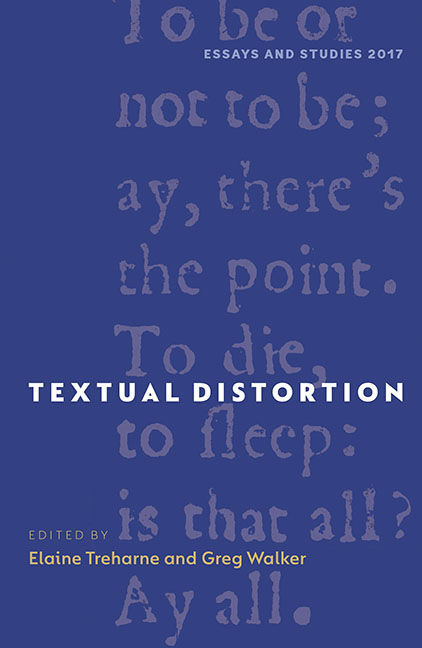Book contents
- Frontmatter
- Dedication
- Contents
- List of Illustrations
- Preface and Acknowledgements
- Notes on Contributors
- Introduction
- The Curious Production and Reconstruction of Oxford, Bodleian Library, Junius 85 and 86
- ‘Through a glass darkly’, or, Rethinking Medieval Materiality: A Tale of Carpets, Screens and Parchment
- Distortion, Ideology, Time: Proletarian Aesthetics in the Work of Lionel Britton
- Shakespeare and Korea: Mutual Remappings
- Dictionary Distortions
- Where Do Indigenous Origin Stories and Empowered Objects Fit into a Literary History of the American Continent?
- Distortion in Textual Object Facsimile Production: A Liability or an Asset?
- The Uncanny Reformation: Revenant Texts and Distorted Time in Henrician England
- The Presence of the Book
- Index
The Curious Production and Reconstruction of Oxford, Bodleian Library, Junius 85 and 86
Published online by Cambridge University Press: 24 August 2019
- Frontmatter
- Dedication
- Contents
- List of Illustrations
- Preface and Acknowledgements
- Notes on Contributors
- Introduction
- The Curious Production and Reconstruction of Oxford, Bodleian Library, Junius 85 and 86
- ‘Through a glass darkly’, or, Rethinking Medieval Materiality: A Tale of Carpets, Screens and Parchment
- Distortion, Ideology, Time: Proletarian Aesthetics in the Work of Lionel Britton
- Shakespeare and Korea: Mutual Remappings
- Dictionary Distortions
- Where Do Indigenous Origin Stories and Empowered Objects Fit into a Literary History of the American Continent?
- Distortion in Textual Object Facsimile Production: A Liability or an Asset?
- The Uncanny Reformation: Revenant Texts and Distorted Time in Henrician England
- The Presence of the Book
- Index
Summary
Oxford, Bodleian Library, Junius 85 and 86 are two manuscripts that contain mostly anonymous, vernacular homilies that focus on the fate of the human body and soul. They also contain an Old English translation of the Visio Sancti Pauli, four bilingual charms, and a homily by Ælfric (c.955–1010). This may seem surprising, as Ælfric explicitly condemned the copying of apocryphal literature, like the Visio Pauli, and, moreover, repeatedly denounced the vernacular textual traditions of his time, cautioning against charms, prognostications and heterodox writings. It is interesting, then, that Ælfric's homily comes directly after a sequence of charms and vernacular homilies of questionable orthodoxy. Many studies have focused their critical efforts on making sense of these unusual groupings, but hardly any explore the material text as the form in which these works survive. As such, this essay will argue that current scholarly understanding of Junius 85 and 86 is distorted by a focus only on specific texts, or on the general appearance of the codices, rather than on a more holistic approach to details of compilation and production.
One useful study of these books is that by Jonathan Wilcox in his examination of the Ælfric homily. Wilcox, however, focuses solely on that text to make a case for its independent transmission amongst the laity in booklet form, and so only briefly mentions the manuscript as a whole. Indeed, when scholars have commented on the state of the material text, their brief remarks are almost wholly negative. Wilcox refers to them as ‘a strikingly low status pair of manuscripts’ that are ‘incongruously scruffy, messy’ and ‘materially poor’. Richard Gameson focuses on the collection's fragmentary nature and observes that the manuscripts are ‘badly damaged’. N. R. Ker's only assessment of the physical condition of the books is that the ‘parchment varies in quality’ and that a few of the mise-en-page features are ‘unusual’. Aside from their shared aesthetic judgements, scholars are also unanimous in their belief that Junius 85 and 86 once constituted a single manuscript that was split into separate volumes at a later date.
- Type
- Chapter
- Information
- Textual Distortion , pp. 6 - 25Publisher: Boydell & BrewerPrint publication year: 2017



